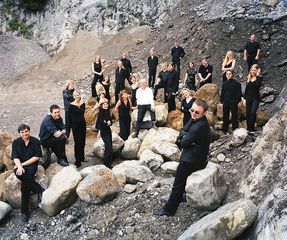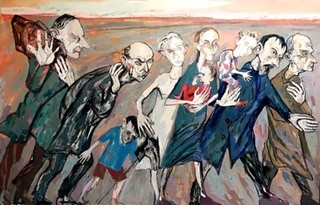|
Back
Tributes and Parodies New York
92nd Street Y
02/02/2017 -
Arvo Pärt: Fratres
Mieczyslaw Weinberg: Chamber Symphony No. 4, Opus 153
Pyotr Ilych Tchaikovsky: Sérénade mélancolique, Opus 26
Modest Mussorgsky: Pictures at an Exhibition (Arranged by J. Cohen/A. Pushkarev)
Valentin Silvestrov: Serenade for Solo Violin
Mate Bekavac (Clarinet)
Kremerata Baltica, Gidon Kremer (Violinist, Founder, Music Director)
Maxim Kantor (Visual Artist)

G. Kremer & Kemerata Baltica (© Christian Lutz)
"Music is still song, even if one cannot literally sing it: it is not a philosophy, not a world-view. It is, above all, a chant, a song the world sings about itself, it is the musical testimony to life."
Valentin Silvestrov.
Devotees of music from the Baltic States had an agonizing choice last night. At one venue, the Estonian Philharmonic Chamber Choir were giving a concert of music by the great Arvo Pärt. At the 92nd Street Y, the equally great Latvian violinist/conductor Gidon Kremer was offering his Kremerata Baltica in a concert not only only with Pärt, but Valentin Silvestrov, Mieczyslaw Weinberg, Tchaikovsky, Mussorgsky, and a surprise world premiere by Mikhail Pletnev.
Decisions, decisions. But for several reasons, Mr. Kremer was the answer. First, to celebrate two birthdays: his own 70th this month, and the 20th anniversary of the ensemble which he created, assembled and has led. Second, Arvo Pärt is always worth hearing, but a whole concert has a certain unavoidable sameness.
Third, because Gidon Kremer has personally been the advocate of the composers he offered last night. And fourth, because he always presents the unexpected.
As a bonus, the Kremerata Baltica looks and plays with the enthusiasm of youth. They are evidently happy associates with their conductor (he shook each and every hand of the players after the concert), and their playing was spot-on. They may be a chamber orchestra, but their sounds could fill the auditorium.
The opening Fratres was hardly unexpected. The variations are almost as popular as Barber’s Adagio. But the music is still enigmatic, the harmonies seeming to straddle the 14th and 20th centuries. Mr. Kremer began with a solo (and oh, even in the four-part harmonies, his sounds were laser-sharp), and the orchestra continued from there. The arrangement may not have been an improvement on the original orchestral, but listening to those inimitable sounds is always an experience.
Mr. Kremer’s advocacy–and Shostakovich’s friendship and respect for Mieczyslaw Weinberg–has been well-known. Perhaps because of his similarity to Shostakovich or for political reasons, he has only come out recently as a major composer. Major and prodigious, his output endless in quantity and quality.
This Fourth Chamber Symphony was his final completed work (though much remains of his unfinished 22nd Symphony), and like all of Weinberg, the moods dart back and forth.
Mr. Kremer had left the stage, but the Kremerata Baltica continued, Orpheus style, without a conductor. That didn’t stop them. The Weinberg work sounded much like Shostakovich at times. But the haunting opening was original, and the one solo instrument, Mate Bekavac’s clarinet, was shown in a variety of guises. First, as an almost invisible backup to the opening Lento movement, but then as a most unexpected Klezmer-style clarinet in the jumpy middle movements.
This, though, was Klezmer with a difference. It was as if the entire orchestra had been inside a Gulag for a decade and then told to play “jolly Jewish music”. Somehow Weinberg made the hilarity of the music turn into a manic hysteria before the slow ending. And while Mr. Kremer was not on stage, his support for the composer is one of his numerous great achievements.
One must also give tribute to the sadly omitted names of Concertmaster Dzeraldas Bidva and cellist Giedrė Dirvanauskaitė for their fine cadenzas.
Mr. Kremer did show up after intermission to begin an uninterrupted trio of works to justify the title of the program, “Russia: Masks and Faces”. The written introduction about his visions of Russia–negative, positive, politically incriminating–started with the innocent Tchaikovsky Serenade, one of two serenades.
But immediately after came, what I consider, the most memorable piece. This was neither words nor music but paintings from Mussorgsky’s Pictures.

M. Kantor: Traveling Comedians (© Kremerata Baltica)
The visual here gives scant exposure to Maxim Kantor’s shattering images during Pictures at an Exhibition.
Mussorgsky’s own visual muse, Viktor Hartmann, was a surrealist 70 years before Surrealism, and one of his paintings–The Tower of Babel–comes at the end of the music. But Mr. Kremer, Russian-born, now a citizen of Europe, could be called a Degenerate Realist. His faces are ghostly, haunting. The circumstances are those of refugees: hopeless bodies at a table, carrying worn bags, a committee of emotionless bureaucrats, sometimes skeletal, always desperate.
I am no art critic, so can only offer resemblances. Mr. Kantor’s backgrounds were the whirling colors of a crazed Van Gogh, the supernatural faces were those of Bosch, the distortions were of El Greco, and the faces bore the political condemnations of the Weimar Republic’s George Grosz.
But they were all Maxim Kantor.
And if it weren’t for the remedy of jocular, off-kilter encores (including a crazy piece by Mikhail Pletnev, to be played “after climbing Mount Weinberg”), I would be having nightmares tonight.
Those pictures were so galvanizing that this “chamber” orchestration of Mussorgsky’s Pictures made little effect. They became familiar background music, and one noticed the difference from Ravel only during the percussion moments: woodblocks and kettledrums.
Near the end, Mr. Kremer strolled back through the orchestra playing another of his favorites, the Ukrainian Valentin Silvestrov. Silvestrov’s simplicity, which edges always on popular shlock or slow cocktail music or jazz, here took on the guise of near-Baroque music for solo violin. And Mr. Kremer’ solo–like the first measures of Fratres–showed the master at work.
For the final measures, the screen showed the sign: “In Memoriam to those who suffered from Russian Totalitarianism”
One might question the past tense. But the meaning was clear.
The encores were, as always unexpected. First, came a work which sounded like Vladmir Martynov (the major composer of La Grande Belleza). The second was Mr. Kremer’s variations on a Schnittke classic (including a parody of the Soviet National Anthem). And finally the premiere of Mikhail Pletnev’s kitschy tribute to composer Weinberg, Nach dem Weinbergsteig.
No, the audience didn’t burst out with a “Happy Birthday” greeting for Mr. Kremer (which comes in two weeks), but his own attitude and the music of “his” composers were celebration enough.
Harry Rolnick
|